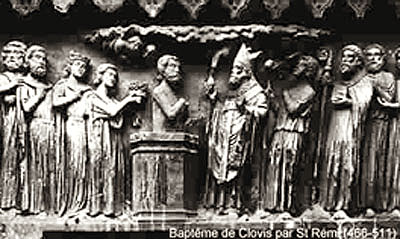Further, according to Kurth, she must have been comfortable with the relationship if she persistently attempted to sway him to Christianity. If their relationship was not so strong, would Clovis have continued to tolerate his wife’s persistent efforts at proselytizing him? Would Clotilda have felt comfortable in her cause if she had doubts as to the disposition of her husband’s feelings toward her? Writes Kurth: “It is obvious that she must have enjoyed considerable ascendancy over his mind in order to have repeatedly urged so great a sacrifice without fear of violent refusal.”
While there has been much written about Clovis’s battlefield epiphany, Clotilda undoubtedly
 laid the groundwork for his conversion. Championing Clotilda's primacy as the prime mover behind Clovis' conversion, Jane Tibbetts Schulenburg (Forgetful of Their Sex) writes, it’s “the ‘Christ of Clotilda’ whom Clovis invokes” and “neither St. [Remigius] nor other members of the official church hierarchy were similarly awarded this type of prominence.” In contrast, Wallace-Hadrill asserted that while Clovis showed goodwill to the Catholic bishops by his marriage to Clotilda, the acute act of his marriage to Clotilda did not prompt his conversion, despite the efforts of his wife and Bishop Remigius. However,Wallace-Hadrill was willing to concede that the groundwork laid by Clotilda and Remigius may have played a key part:
laid the groundwork for his conversion. Championing Clotilda's primacy as the prime mover behind Clovis' conversion, Jane Tibbetts Schulenburg (Forgetful of Their Sex) writes, it’s “the ‘Christ of Clotilda’ whom Clovis invokes” and “neither St. [Remigius] nor other members of the official church hierarchy were similarly awarded this type of prominence.” In contrast, Wallace-Hadrill asserted that while Clovis showed goodwill to the Catholic bishops by his marriage to Clotilda, the acute act of his marriage to Clotilda did not prompt his conversion, despite the efforts of his wife and Bishop Remigius. However,Wallace-Hadrill was willing to concede that the groundwork laid by Clotilda and Remigius may have played a key part:The pattern is familiar. Defeat stares him in the face and his gods have deserted him; his thoughts turn to his wife’s god, to whom he prays in his heart for victory; and victory is his. Like Constantine in a similar predicament, Clovis knows that he must throw in his lot with the new god...The parallel with the battle of the Milvian Bridge does not disprove the later story. His wife and St Remigius were there to remind Clovis of Constantine, if he needed reminding.
On the other hand, as I.N. Wood (The Merovingian Kingdoms) noted that Avitus made no mention of Clotilda’s role in converting Clovis, nor of a battlefield conversion, but credits Clovis for finding his own way.
Regardless of who deserves credit for converting the Frankish King, there was a risk for Clovis in deciding to convert. The majority of the Franks were pagan or Arian and for Clovis to maintain his power over the Franks, his bodyguard would also have agreed to convert or they would have disbanded and eliminated Clovis’s power base. Clovis had doubts as to whether they would join him and called a meeting to inform them of his intention. They all agreed to be converted with their king. Thus, around 3,000 of his warriors*, (though this may be an exaggerated number) were baptized with him.

Wallace-Hadrill theorized that Clovis’s conversion wasn’t “total” but more the acceptance of another god “to his people’s pantheon, perhaps in a commanding position.” Still, this is different than baptism and “officially” accepting no other gods but the Christian. This last was probably made easier by the “pantheon” of saints.
But even adhesion calls for conviction of right, and it is no belittlement of Clovis’ act to term it a political decision, taken after weighing Frankish pagan conservatism against the assured approval of the Gallo-Romans.Perhaps the Gallo-Roman episcopate had finally demanded conversion, or Clovis had thought that the Empire would actively support him against the Goths. Finally, as Wallace-Hadrill points out, “Without Tolbiac [the battle with the Alamans], the proof would have been lacking that the Christian god gave victory over other Germans.” Tolbiac was, to use a contemporary term, the tipping point.
*Kurth believed that the average Frank cared not what the religion of his ruler was, but this was not so for the bodyguard, which was “bound to the king by a pledge of honour, was associated in all his acts and shared in his good and evil forturnes…they shared in all his personal interests, in his friendships and enmities, and his Gods were their Gods. What would become of this intimate communion of views and sentiments when Clovis passed from the service of Wodin to the service of Christ?”
UP NEXT: Clotilda's Political Influence
SOURCES:
Godefroid Kurth, Saint Clotilda.
Jane Tibbetts Schulenburg, Forgetful of Their Sex.
J.M. Wallace-Hadrill, The Long-Haired Kings.
Ian Wood, The Merovingian Kingdoms.
Justine Davis Randers-Pehrson, Barbarians and Romans.
J.B. Bury, Invasion of Europe.
Samuel Dill, Roman Society.
Jeremiah O’Sullivan and John F. Burns, Medieval Europe (New York: F.S. Crofts & Co., 1943).
No comments:
Post a Comment